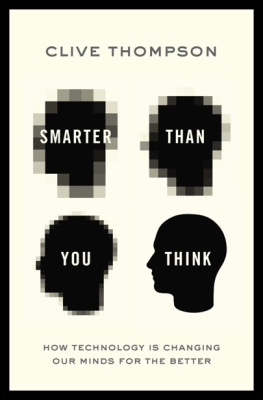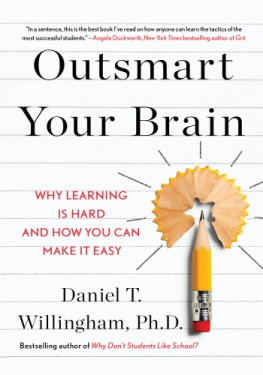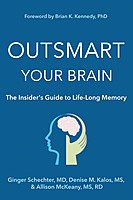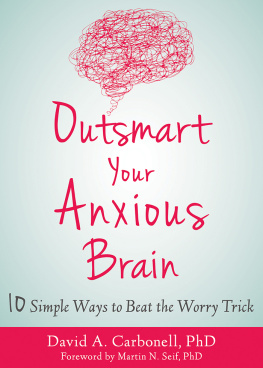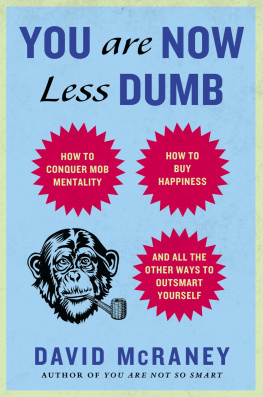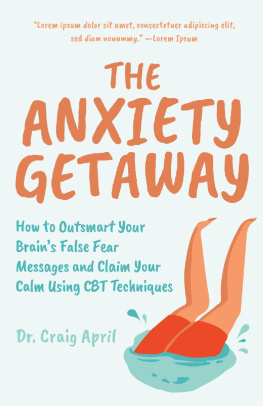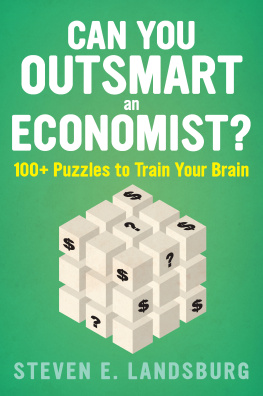Outsmart Hb
Here you can read online Outsmart Hb full text of the book (entire story) in english for free. Download pdf and epub, get meaning, cover and reviews about this ebook. publisher: Harpercollins, genre: Detective and thriller. Description of the work, (preface) as well as reviews are available. Best literature library LitArk.com created for fans of good reading and offers a wide selection of genres:
Romance novel
Science fiction
Adventure
Detective
Science
History
Home and family
Prose
Art
Politics
Computer
Non-fiction
Religion
Business
Children
Humor
Choose a favorite category and find really read worthwhile books. Enjoy immersion in the world of imagination, feel the emotions of the characters or learn something new for yourself, make an fascinating discovery.
- Book:Outsmart Hb
- Author:
- Publisher:Harpercollins
- Genre:
- Rating:4 / 5
- Favourites:Add to favourites
- Your mark:
- 80
- 1
- 2
- 3
- 4
- 5
Outsmart Hb: summary, description and annotation
We offer to read an annotation, description, summary or preface (depends on what the author of the book "Outsmart Hb" wrote himself). If you haven't found the necessary information about the book — write in the comments, we will try to find it.
Unknown: author's other books
Who wrote Outsmart Hb? Find out the surname, the name of the author of the book and a list of all author's works by series.
Outsmart Hb — read online for free the complete book (whole text) full work
Below is the text of the book, divided by pages. System saving the place of the last page read, allows you to conveniently read the book "Outsmart Hb" online for free, without having to search again every time where you left off. Put a bookmark, and you can go to the page where you finished reading at any time.
Font size:
Interval:
Bookmark:

THE PENGUIN PRESS
Published by the Penguin Group
Penguin Group (USA) LLC
375 Hudson Street
New York, New York 10014, USA

USA Canada UK Ireland Australia New Zealand India South Africa China
Penguin.com
A Penguin Random House Company
First published by The Penguin Press, a member of Penguin Group (USA) LLC, 2013
Copyright 2013 by Clive Thompson
Penguin supports copyright. Copyright fuels creativity, encourages diverse voices, promotes free speech, and creates a vibrant culture. Thank you for buying an authorized edition of this book and for complying with copyright laws by not reproducing, scanning, or distributing any part of it in any form without permission. You are supporting writers and allowing Penguin to continue to publish books for every reader.
ISBN 978-1-101-63871-2
To Emily, Gabriel, and Zev
Whos better at chesscomputers or humans?
The question has long fascinated observers, perhaps because chess seems like the ultimate display of human thought: the players sit like Rodins Thinker, silent, brows furrowed, making lightning-fast calculations. Its the quintessential cognitive activity, logic as an extreme sport.
So the idea of a machine outplaying a human has always provoked both excitement and dread. In the eighteenth century, Wolfgang von Kempelen caused a stir with his clockwork Mechanical Turkan automaton that played an eerily good game of chess, even beating Napoleon Bonaparte. The spectacle was so unsettling that onlookers cried out in astonishment when the Turks gears first clicked into motion. But the gears, and the machine, were fake; in reality, the automaton was controlled by a chess savant cunningly tucked inside the wooden cabinet. In 1915, a Spanish inventor unveiled a genuine, honest-to-goodness robot that could actually play chessa simple endgame involving only three pieces, anyway. A writer for Scientific American fretted that the inventor Would Substitute Machinery for the Human Mind.
Eighty years later, in 1997, this intellectual standoff clanked to a dismal conclusion when world champion Garry Kasparov was defeated by IBMs Deep Blue supercomputer in a tournament of six games. Faced with a machine that could calculate two hundred million positions a second, even Kasparovs notoriously aggressive and nimble style broke down. In its final game, Deep Blue used such a clever ploytricking Kasparov into letting the computer sacrifice a knightthat it trounced him in nineteen moves. I lost my fighting spirit, Kasparov said afterward, pronouncing himself emptied completely. Riveted, the journalists announced a winner. The cover of Newsweek proclaimed the event The Brains Last Stand. Doomsayers predicted that chess itself was over. If machines could outthink even Kasparov, why would the game remain interesting? Why would anyone bother playing? Whats the challenge?
Then Kasparov did something unexpected.
The truth is, Kasparov wasnt completely surprised by Deep Blues victory. Chess grand masters had predicted for years that computers would eventually beat humans, because they understood the different ways humans and computers play. Human chess players learn by spending years studying the worlds best opening moves and endgames; they play thousands of games, slowly amassing a capacious, in-brain library of which strategies triumphed and which flopped. They analyze their opponents strengths and weaknesses, as well as their moods. When they look at the board, that knowledge manifests as intuitiona eureka moment when they suddenly spy the best possible move.
In contrast, a chess-playing computer has no intuition at all. It analyzes the game using brute force; it inspects the pieces currently on the board, then calculates all options. It prunes away moves that lead to losing positions, then takes the promising ones and runs the calculations again. After doing this a few timesand looking five or seven moves outit arrives at a few powerful plays. The machines way of thinking is fundamentally unhuman. Humans dont sit around crunching every possible move, because our brains cant hold that much information at once. If you go eight moves out in a game of chess, there are more possible games than there are stars in our galaxy. If you total up every game possible? It outnumbers the atoms in the known universe. Ask chess grand masters, How many moves can you see out? and theyll likely deliver the answer attributed to the Cuban grand master Jos Ral Capablanca: One, the best one.
The fight between computers and humans in chess was, as Kasparov knew, ultimately about speed. Once computers could see all games roughly seven moves out, they would wear humans down. A person might make a mistake; the computer wouldnt. Brute force wins. As he pondered Deep Blue, Kasparov mused on these different cognitive approaches.
It gave him an audacious idea. What would happen if, instead of competing against one another, humans and computers collaborated? What if they played on teams togetherone computer and a human facing off against another human and a computer? That way, he theorized, each might benefit from the others peculiar powers. The computer would bring the lightning-fastif uncreativeability to analyze zillions of moves, while the human would bring intuition and insight, the ability to read opponents and psych them out. Together, they would form what chess players later called a centaur: a hybrid beast endowed with the strengths of each.
In June 1998, Kasparov played the first public game of human-computer collaborative chess, which he dubbed advanced chess, against Veselin Topalov, a top-rated grand master. Each used a regular computer with off-the-shelf chess software and databases of hundreds of thousands of chess games, including some of the best ever played. They considered what moves the computer recommended; they examined historical databases to see if anyone had ever been in a situation like theirs before. Then they used that information to help plan. Each game was limited to sixty minutes, so they didnt have infinite time to consult the machines; they had to work swiftly.
Kasparov found the experience as disturbing as it was exciting. Freed from the need to rely exclusively on his memory, he was able to focus more on the creative texture of his play. It was, he realized, like learning to be a race-car driver: He had to learn how to drive the computer, as it weredeveloping a split-second sense of which strategy to enter into the computer for assessment, when to stop an unpromising line of inquiry, and when to accept or ignore the computers advice. Just as a good Formula One driver really knows his own car, so did we have to learn the way the computer program worked, he later wrote. Topalov, as it turns out, appeared to be an even better Formula One thinker than Kasparov. On purely human terms, Kasparov was a stronger player; a month before, hed trounced Topalov 40. But the centaur play evened the odds. This time, Topalov fought Kasparov to a 33 draw.
In 2005, there was a freestyle chess tournament in which a team could consist of any number of humans or computers, in any combination. Many teams consisted of chess grand masters whod won plenty of regular, human-only tournaments, achieving chess scores of 2,500 (out of 3,000). But the winning team didnt include any grand masters at all. It consisted of two young New England men, Steven Cramton and Zackary Stephen (who were comparative amateurs, with chess rankings down around 1,400 to 1,700), and their computers.
Font size:
Interval:
Bookmark:
Similar books «Outsmart Hb»
Look at similar books to Outsmart Hb. We have selected literature similar in name and meaning in the hope of providing readers with more options to find new, interesting, not yet read works.
Discussion, reviews of the book Outsmart Hb and just readers' own opinions. Leave your comments, write what you think about the work, its meaning or the main characters. Specify what exactly you liked and what you didn't like, and why you think so.

